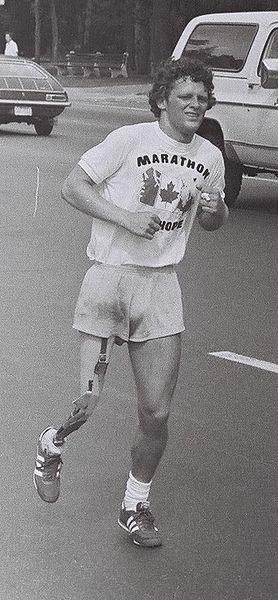
Terry Fox was an active Canadian teen who played in different sports disciplines such as basketball and distance running. However, on March 1977, barely 19 years old, he was diagnosed with osteosarcoma, or a malignant cancer of the bone, which caused him to lose one of his limbs.
Nevertheless, his condition inspired him to continue pursuing his well-loved sports and to embark on a cross-country run in 1980 spanning more than 5,000 kilometers in over 140 days to increase cancer awareness and raise research funds before he was forced to quit when his cancer metastasized to his lungs despite the aggressive chemotherapy treatment. He later died in New Westminster, British Columbia, on June 28, 1981. He was 22 years old.
Today his name is more associated with the Marathon of Hope, one of the biggest one-day marathons for cancer research, raising over $500 million. He's also become the poster boy for osteosarcoma, a disease the doctors are saying is now highly curable.
In an article published in CBC News British Columbia website, Dr. Jay Wunder, one of Toronto's Mount Sinai Hospital orthopedic surgeons, reveals that the cure rate for the same disease suffered by Fox is already 80%. Moreover, patients don't have to resort to leg amputation, which was often the first form of defense against cancer spread during Fox's time. Rather, the patients go through a limb reconstructive surgery after the tumor is removed. The cure rate is even positive among older adults at 70%, although it's very rare for adults to develop osteosarcoma.
Nevertheless, the doctor wants to emphasize that although the prognosis for osteosarcoma is much better than decades ago, the same thing cannot be said in other types of sarcomas that develop on the soft tissues such as blood vessels, muscles, and skin.
Even with surgery, many patients suffer from a relapse, and chemotherapy usually proves to be ineffective as a form of treatment.

